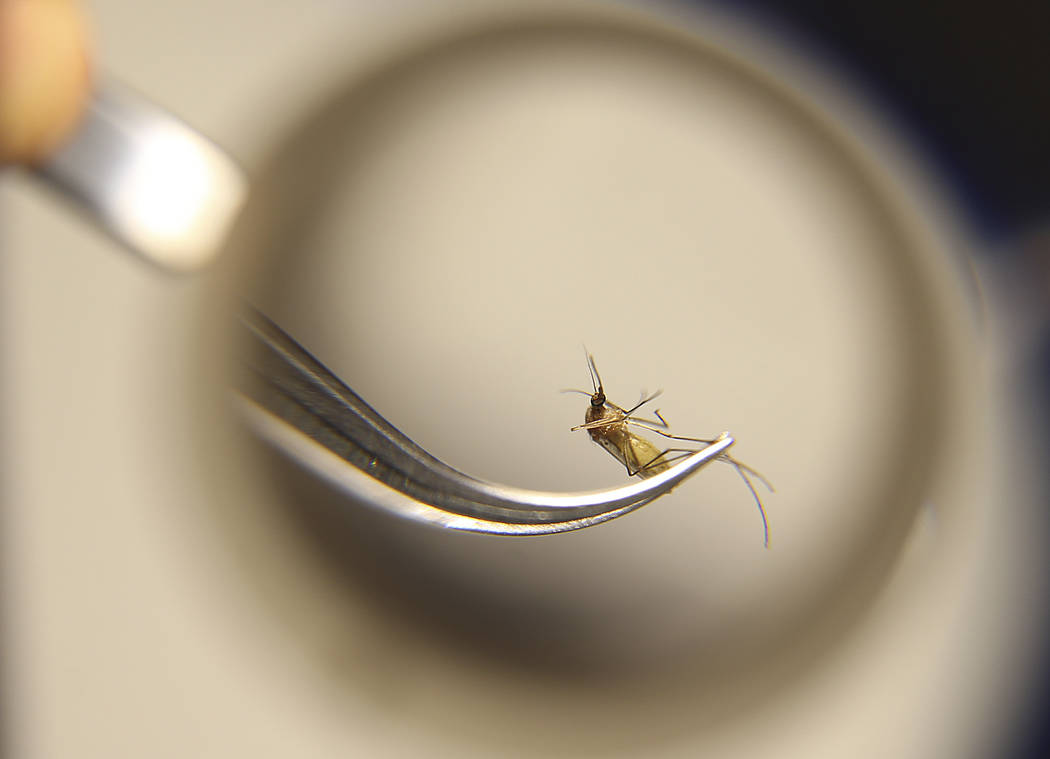First West Nile death in Clark County in 2019 reported
The Southern Nevada Health District on Thursday reported the first death this year of a Clark County resident from West Nile virus.
The resident, a woman over 50, had a serious form of the illness that infects the central nervous system. People over 50 are at greater risk of developing serious symptoms from the virus and should take special care to avoid mosquito bites, according to the Centers for Disease Control and Prevention.
As of Oct. 11, there were 43 reported cases of the virus in Clark County residents, including 34 cases of the more serious neuroinvasive form of the illness, according to the health district. In August, the district declared an outbreak when the case number surpassed that of any year since the virus was first detected in Nevada in 2004.
“This case is a tragedy, and we want to remind the public that mosquitoes can pose serious health threats,” said Dr. Michael Johnson, director of the district’s community health division.
Seven county residents have died from the virus since 2004, the last one in 2017.
Most people who contract the virus, which isn’t spread person-to-person, will have no symptoms at all or very mild symptoms.
About one in five people will develop mild symptoms that may include fever, headache, body aches, vomiting, diarrhea or rash, according to the district. Most people with this type of the virus recover completely, though fatigue and weakness can last for weeks or months.
Only about one in 150 people infected with the virus develop a serious illness affecting the central nervous system, such as encephalitis (inflammation of the brain) or meningitis (inflammation of the membranes that surround the brain and spinal cord).
Recovery from the neuroinvasive form of the illness can take several weeks or months, and the effects on the central nervous system may be permanent. Approximately one in 10 people who develop the neuroinvasive form of West Nile virus die from the illness.
In Clark County, mosquito season lasts from April through November, according to the health district.
Genetics’ role
Research suggests that genetics play a major role in who becomes seriously ill from West Nile virus , said Amy Stone, an immunologist and assistant professor of microbiology at Touro University Nevada in Henderson.
In her research, Stone focuses on cellular immune responses to infectious diseases. She has studied “sentinel receptors,” molecules that “guard the places of your body that are exposed to the world,” such as the nose, mouth and skin.
Her research suggests that a person who, due to genetics, has receptors that mount a strong response to West Nile virus can fight it off and avoid more serious symptoms.
However, for a person with a weak response, “the virus is able to escape the sentinel cells at the site of infection — the mosquito bite — and spread through the body.”
“We don’t really understand how these genes contribute to overall health,” Stone said, noting that having a weak response to one virus doesn’t mean a person will have a weak response to another virus. Through further research, “we’re trying to develop new therapeutic ways to help your immune system fight better” against West Nile and other mosquito-borne viruses.
In the meantime, she said, “the best defense we have is controlling mosquito bites” by wearing long sleeves and long pants outdoors at dusk and dawn and using insect repellent.
Contact Mary Hynes at mhynes@reviewjournal.com or 702-383-0336. Follow @MaryHynes1 on Twitter.


















